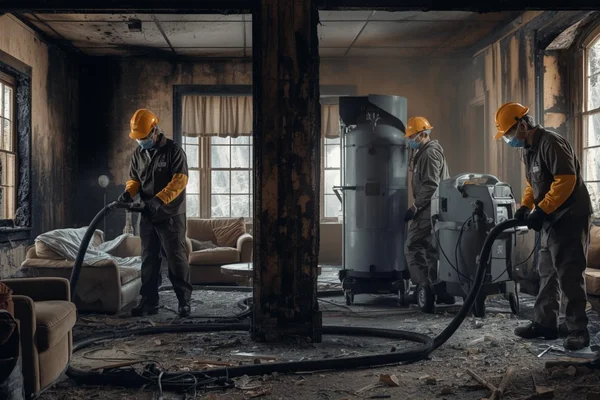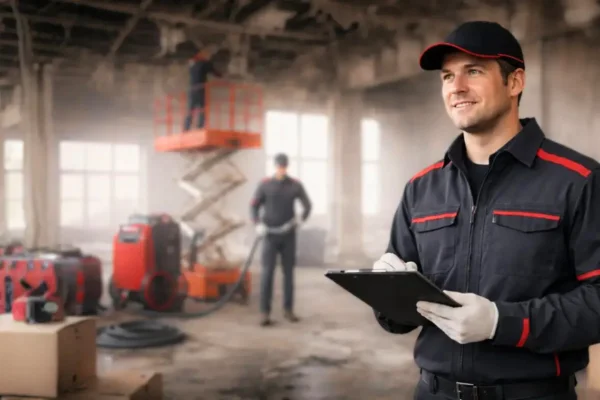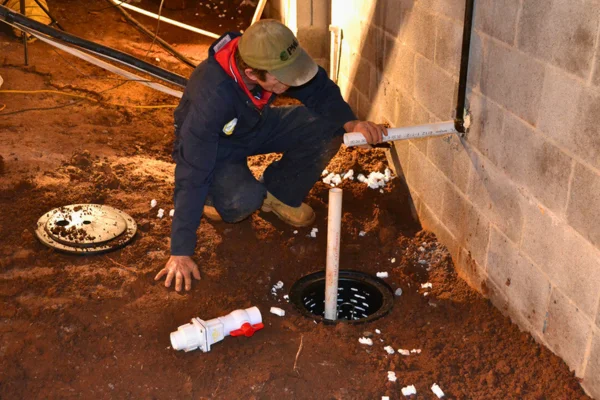Water damage in the home can be costly. To avoid water damage, look out for signs of water damage, such as stains or musty odors. Home water damage often starts small and goes undetected. Taking steps now can help you avoid the costly effects of water damage and related issues around the house.
Water damage often goes unnoticed until it’s too late. Regularly inspect your roof, plumbing, and gutters to catch issues early. Manage seasonal changes that affect your home’s integrity. Taking these proactive steps helps prevent costly repairs and keeps your home dry and secure. Understanding common flooding damage risks is key to protecting your property.
Let’s dig deeper into the issue of water damage in the home and what you can do to avoid it!
Why Water Damage in the Home Is a Serious Concern
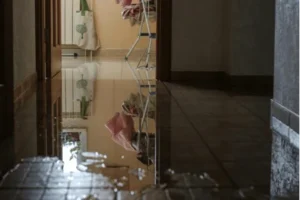
Water or moisture damage isn’t just an inconvenience; it can lead to significant financial and structural problems for your home. Understanding issues related to it is essential for protecting your home from long-term damage.
Financial and Structural Impact
Neglecting water-related issues in your home can result in severe structural damage and costly repairs. Untreated water weakens your home’s foundation and can lead to sagging floors, mold growth, and diminished property value. Early signs, such as wall discoloration or peeling paint, shouldn’t be ignored. Proactively maintaining your roof, gutters, and plumbing helps prevent damage and expensive repairs.
Staying vigilant and addressing issues quickly safeguards your home’s integrity and your investment. Taking simple preventative steps now can save you significant time, stress, and money in the long run.
Health Risks from Mold and Mildew
Flooding damage encourages the growth of mold and mildew, which can lead to serious health problems. These fungi thrive in damp areas, triggering allergies, respiratory issues, and skin irritation. Mold spores circulate in the air, affecting vulnerable groups like children and the elderly most severely.
To protect your family, promptly fix leaks and control moisture. Keep your home well-ventilated and consider installing dehumidifiers in areas prone to dampness. Taking these precautions helps reduce the risk of mold and keeps indoor air safe and healthy.
Common Causes of Residential Water Damage
Roof Leaks
Roof leaks are a leading cause of moisture-related issues. Weather can wear down shingles, flashing, or gutters, allowing water to seep in. Stains on ceilings or walls are common warning signs. Regular roof inspections and gutter cleaning help minimize deterioration. Addressing wear and tear early helps preserve your home’s condition and value.
Plumbing Failures
Leaky pipes, aging fixtures, and faulty appliances can allow moisture to accumulate rapidly. Hidden leaks often worsen over time. Routine plumbing inspections and prompt repairs help you avoid serious problems. Stay alert for signs of dampness or unusual odors to maintain a dry and secure home.
Foundation Cracks
Cracks caused by shifting soil, poor drainage, or invasive roots can allow unwanted moisture into your home. These issues may compromise structural stability. Inspect your foundation regularly and seal any cracks to maintain a solid, dry base.
Appliance Malfunctions
Malfunctioning appliances, such as washing machines, dishwashers, and refrigerators, can release excess moisture into your home. Inspect hoses and connections often, replace worn components, and shut off water valves when not in use. These small steps help prevent leaks and preserve your home’s interior.
Best Ways to Avoid Water Damage to Your Home
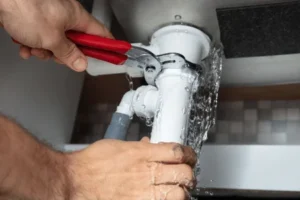
Preventing flooding damage requires proactive measures and regular maintenance. Small leaks and unnoticed issues can escalate into costly problems if left unaddressed. Knowing the best prevention methods can help protect your home effectively.
Maintain Gutters and Downspouts
Gutters and downspouts are crucial to prevent water damage. Clean them regularly, especially in the Fall, to remove leaves and debris that block water flow. Check for sagging or misalignment, as even small shifts can cause water to pool. Ensure downspouts direct water at least six feet away from your foundation. Installing gutter guards helps reduce debris buildup. Proper maintenance keeps your home protected from roof, wall, and foundation damage caused by overflowing water.
Check and Repair Plumbing Leaks Early
Regularly inspect pipes, fixtures, and appliances for leaks. Look for water stains, damp spots, or mold near sinks, toilets, and washing machines. Check behind cabinets and appliances, too. Fix leaks quickly—tighten fittings, replace washers, or call a plumber for serious issues. Early leak repairs prevent costly damage and protect your home. Routine plumbing maintenance ensures your system remains efficient and free from any damage.
Inspect the Roof Regularly for Damage
Check your roof twice yearly for missing, cracked, or curling shingles, especially around chimneys and vents. Sagging areas may indicate structural problems. Clear debris from gutters to ensure proper drainage. Regular inspections help catch issues early, preventing leaks and expensive repairs. If unsure, hire a professional to assess your roof and maintain your home’s protection.
Grade Soil Away from the Foundation
Ensure the soil slopes downward at least six inches within ten feet of your home’s foundation. Proper grading directs rainwater away, preventing pooling and water issues. Adjust soil by adding or removing dirt, especially after heavy rains or landscaping. Regularly check the slope to maintain drainage. Consult a landscaper if needed. Good grading safeguards your foundation and reduces water-related risks.
Install a Sump Pump in the Basement
A sump pump removes excess water from your basement during heavy rain or flooding, protecting your foundation and preventing mold growth. Select a model with a battery backup to continue operating during power outages. Regularly test and maintain your pump to ensure reliability. Installing a sump pump offers peace of mind by keeping your basement dry and avoiding costly water damage repairs.
Use Smart Water Sensors for Early Detection
Smart water sensors detect leaks and moisture early, sending alerts to your phone. Place sensors in high-risk areas, such as basements, kitchens, and bathrooms, for continuous monitoring. Some sensors can trigger alarms or automatically activate sump pumps. Easy to install and integrate with smart home systems, they help prevent major damage. Regularly test sensors to ensure proper function. Investing in these devices saves time, money, and stress by catching problems early.
Water damage in the home can lead to costly repairs. Learn how to avoid water damage by spotting early signs of water damage. Regular maintenance helps prevent water damage. Addressing leaks promptly can protect your home from extensive water damage.
Seasonal Tips for Water Damage Prevention
Each season presents unique challenges that can lead to costly repairs if left unaddressed. Preparing ahead can help you avoid water damage and keep your home safe throughout the year. Stay proactive with seasonal maintenance tips!
Winter: Insulate Pipes and Monitor Ice Dams
In winter, protecting your home from moisture issues means insulating pipes and watching for ice dams. Pipes in unheated areas like basements or attics can freeze, crack, and leak. Use insulation sleeves or heat tape to safeguard them.
Ice dams form when melted snow refreezes along the roof, blocking drainage and allowing water to seep in. Icicles are a warning sign. Clear roof snow or maintain consistent attic temperatures to reduce winter-related moisture risks.
Spring: Clean Gutters and Check for Flood Risks
Spring is an ideal time to prevent flooding damage by cleaning gutters and assessing flood risks. Clogged gutters cause water to pool near your foundation, which can lead to leaks and damage. Remove leaves, twigs, and debris to ensure smooth drainage. Also, inspect your yard’s slope to make sure water drains away from your home. Identify and level out low spots to help avoid costly moisture-related issues throughout the rainy season.
When to Call a Water Damage Specialist
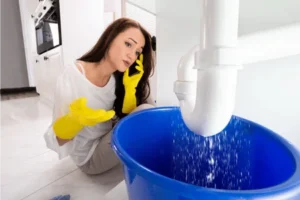
Knowing when to call professionals can save you time and money in the long run. They can assess the situation and prevent further damage related to leaks, ensuring your home remains safe and dry.
Signs You Can’t Ignore
Recognizing the signs of water damage early can save you from costly repairs and serious structural issues. Stay alert for these common warning signs around your home.
- Water stains on ceilings or walls
- Musty odors that suggest mold or mildew
- Peeling paint or wallpaper from hidden moisture
- Warped or buckled floors caused by prolonged dampness
- Unexplained spikes in your water bill
- Excess indoor humidity or condensation on windows
If you notice any of these warning signs, don’t delay. Contact an expert promptly to inspect the area, find the source, and prevent further damage from spreading throughout your home.
How a Pro Can Save You Time and Money
Moisture-related damage can escalate quickly, leading to costly repairs and serious risks. A professional can assess the situation, uncover hidden problems, and apply effective solutions. Ignoring signs of excess moisture can result in structural issues and unhealthy mold growth, compromising the safety of your home. Specialists have the right tools to dry affected areas and restore materials before lasting harm occurs. Hiring an expert ensures efficiency, protects your investment, and prevents bigger complications.
Conclusion- Preventing Water Damage at Home
To avoid water damage in your home, staying proactive is crucial. By regularly inspecting your roof, plumbing, and gutters, and addressing issues immediately, you can protect your space from costly repairs. Seasonal maintenance and smart technology, like water sensors, further enhance your defenses. Remember, the sooner you identify a potential problem, the easier it is to address.
Water damage in the home can lead to costly repairs. To prevent water damage, regularly inspect plumbing and roofing. Look for early signs of water damage like stains, odors, or mold. Taking action quickly helps avoid water damage and protects your home from serious structural and health-related issues.
Protect Your Home Before It’s Too Late – Our Experts Are Ready to Assist


